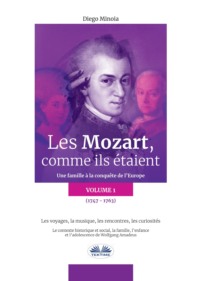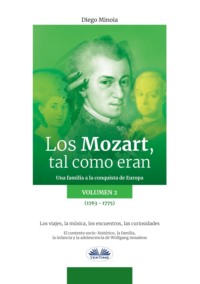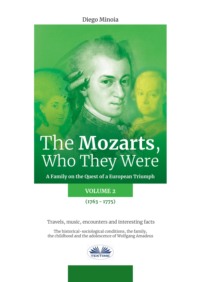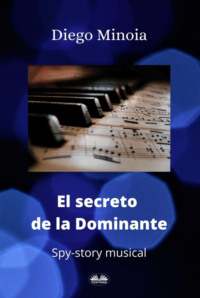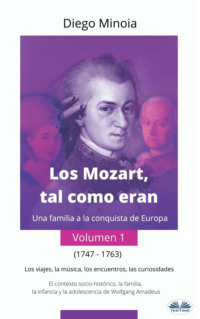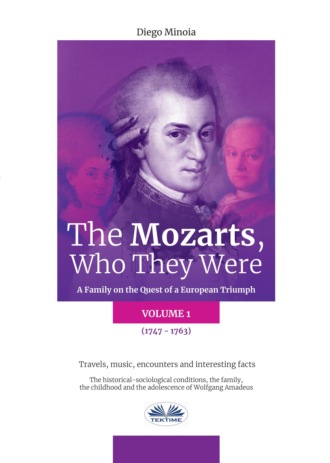
Полная версия
The Mozarts, Who They Were (Volume 1)
Wolfgang's father
Johann Georg Leopold Mozart (1719 -- 1787) Born in the German city of Augsburg from the second marriage of Johann Georg Mozart, an artisan bookbinder, to Anna Maria Sulzer, who came from a family of textile workers that had moved to Augsburg from Baden-Baden. The Mozart family tree can be traced back three centuries to the Bavarian Swabia, geographically situated west of Munich, which comprised the surroundings of Augsburg and reached what are today's borders of Austria. Leopold's ancestors were farmers, bricklayers and craftsmen (textiles and bookbinders) who relocated from the Augsburg countryside to the city.
Leopold was the first born to Johann Georg Mozart and Anna Maria Sulzer. They had eight children of which only five survived from infancy. Unlike his siblings, who continued working in the family business as bookbinders, Leopold was intended to pursue a career in the clergy by his godfather, Johann Georg Grabher, Dean of the Duomo of Augsburg who noted his strong studious talents. Upon finishing elementary school, he was enrolled in 1727 at the Gymnasium which required a six year course of study. Leopold completed the program two years later than the established six years (it is not clear if the reason was due to illness or resistance to discipline and attitude toward the priesthood), though he did graduate in 1735 magna cum laude. In accordance with the times, we can assume that his cultural level was certainly superior to that of the average citizen. The Jesuit school was, in fact, recognized by the city and neighboring regions for its level of culture, so much so, that the children of the noble and upper-classes attended the institution.
The school curriculum foresaw multi-year courses in Latin and Greek, Philosophy, Logic, as well as Mathematics and Natural Sciences, Theology and Rhetoric. During Leopold's years of study, he also underwent a musical formation related to singing (he was a singer in religious ceremonies and theatrical exhibitions), keyboard instruments (organ and harpsichord) and the violin. It appears that he participated in various scholastic performances and in eight theatrical plays as an actor and singer.
It is important to highlight that in that epoch, instrumental education was not disassociated from the elements of composition, in consideration of the fact that the best instrumentalists were put to the test of their capacity to improvise. In order to accomplish this, they had to acquire at least the basics that would allow them to be proficient in moving on a harmonic series and to variate melodies by modulating within the closest keys. After the Gymnasium, Leopold was enrolled at the St. Salvator Lyceum of the Jesuits (a two or three year program), but upon the death of his father, he suspended his studies before the end of the first year.
At that point, he could have followed in his father's footsteps in the family bookbinding business or return to his studies and conclude his sacerdotal training. He was not, evidently, inclined toward either and decided to leave Augsburg (abandoning his widowed mother and younger siblings) and move to Salzburg where he enrolled in the local Benedictine University to study Philosophy and Law where he initially did well (he earned his Baccalaureate in Philosophy with magna cum laude in his Logic Exam on 22 July 1738). His enrollment documentation is on the registry at the Salzburg University: 7 December 1737, personal information, location of origin, previous studies, enrollment tax. The impoverished and meritorious students were exempt from the university enrollment tax. Leopold paid an enrollment tax of 45 kreutzers, a higher fee compared to the other students on the same list, who payed 30 or 40 kreutzers.
So he began his studies in Philosophy, a two-year course that included Logic, Ethics, and Physics (the Philosophy course was mandatory for all students, after which they could choose a final specialization of study: Theology, Law, Medicine). On 22 July 1738, during the stately ceremony held at 8 o'clock in the Great Hall of the University, the Baccalaureates (a sort of "pre" degree) were proclaimed in the order of their scores. Leopold ranked 49th out of 54 students; he was not the most brilliant graduate.
Something, however, led him astray from his university engagements (possibly musical studies, his true passion? Or had he met the woman who was to become his wife? Probably both of these elements had an impact on him) and in 1739 he was expelled from the university for a lack of commitment and poor attendance. He reappears later in the role of valet de chambre with the job of violin musician for Count Johann Baptist von Thurn-Valsassina and Taxis, Canonical of the Cathedral. During those years of study and musical insight and depth, not to mention being self-taught as we have no mention of his teachers' names (with the exception of some probable supervision from his acquaintance, Eberlin, who was the organist for the Court and then Kapellmeister), he composed his first works: the six Church and Chamber sonatas op. 1, dedicated to his "master", a commonly used expression that in that epoch.
He also challenged himself in the composition of singer; vocal pieces with soloists and a chorus accompanied by an organ and numerous instruments. The ambition and the perseverance were not lacking if three years later, in 1743, Leopold Mozart was hired as fourth violin in the orchestra of the Prince-Archbishop of Salzburg, Leopold Anton Freiherr von Firmian. Thanks to this post, initially without a salary, eventually guaranteed a regular income and even if he was not wealthy, he was able to marry Anna Maria Pertl in 1747. The violinists were also interrelated with the violin and piano teachers to the young members of the chorus of the Cathedral, an experience that proved useful for future teaching abilities: the instruction provided for his own children and his drafting methods for the violin, which beheld its first edition in 1756, the year of Wolfgang's birth. His career seemed to be progressing at a good pace.
In 1758, he was promoted to second violin in the Princely Orchestra and Composer of the Court with an average annual salary of 400 guldens (florins). And finally, in 1763, the Prince Archbishop Siegmund Christoph von Schrattenbach, to which he had dedicated his text "A Treatise on the Fundamental Principles of Violin Playing", nominated him Vice-Kapellmeister. To give an idea of the relative salaries of the musicians in that period, imagine that in 1759, when Franz Joseph Haydn was at the service of Count von Morzin, he earned 200 florins annually and in 1761, when he served Prince Hesterhazy as Vice-Kapellmeister, he earned 400 florins annually.
It was in 1763 that Leopold began requesting long paid leaves of absence to take his children on tour in the role of child prodigies. He dedicated his life to musical education and to the success of his children, glorifying himself and maybe excessively proud toward the Salzburg community for his early success (which was by him abundantly emphasized in his letters that he attentively sent to his employer and fellow citizens).
The humiliation of not succeeding in obtaining the coveted position of Kapellmeister transformed his personality into that of a perpetually suspicious man, always ready and waiting to complain about real or presumed intrigues that would threaten him or his children. Conversely, the arrogance in which he expressed himself as too sure of himself and his opinions, rendered him unpopular to many, both in Salzburg and in the European Courts where he spent time. This character trait was evidently passed on to his son, who often behaved haughtily toward the other musicians, regarding without exception, all of them, as inferior to him.
Leopold Mozart: man, musician, teacher, father
The man
The ambitious character and his justifiably human element of envy distinguished Leopold as a man who was perpetually dissatisfied with his condition, which may possibly be due to the influence of the characteristic attributes of the Suevians, who were described as moody while at the same time obstinate in their pursuit of attaining their goal, not to mention crafty (and of this craftiness, especially in business, we find ample testimony in the epistolary of which we will examine in the following chapters of this book). His cultural formation which was reasonably born from the Age of Enlightenment, allowed him a glimpse of a potential reality made up of hypocrites who supported the weak and the worthy.
Life's reality, exposed and often lived unhappily like an insult to the artistic propositions offered by the Mozart family, saw him arouse enthusiasm for the great praise, the gifts and the honors received. But also to gradually assess the distance between promises made by the nobility and the relative decisions, among them the sudden infatuation for his children's' extraordinary gifts (especially that of Wolfgang) and the likewise abrupt about-face of a shallow aristocracy, ever ready to welcome the "newest arrival" which over-shadowed whoever was in the limelight (especially if, like Wolfgang, one was not able to manage the delicate balance of the relations with he who felt superior by privilege).
He was certainly, as reported by many, a man "who was difficult to feel a fondness for" and "of a sarcastic spirit", even if he had many friends that spent time with him and who held him in high esteem. No doubt they had the patience to listen to his repetitive recriminations against whoever did not recognize the merits that he believed to possess. Dominikus Hagenauer, son of a friend and the Mozart's landlord of their apartment in Getreidegasse, writes in his diary upon the occasion of the death of Leopold: "He was a man of great intelligence and wisdom (...) who in his own homeland had the misfortune of being the victim of persecution and was appreciated less by us than in other great European cities". These words seem to resonate with the complaints of Leopold, as well as the descriptions of his astounding successes (according to him naturally, given that his word was often not confirmed by witnesses) during the course of his journeys. Descriptions, it should be remembered, that were included in the letters sent to Hagenauer's father (and re-proposed who knows how many times upon return from his travels) that were destined to be disseminated, as expressly arranged by Leopold Mozart to the Salzburg people until they reached the Archiepiscopal throne.
In truth, even outside of Salzburg, Leopold Mozart did not always receive testimony of a kind character. In a letter from Vienna written by the musician Johann Adolph Hasse in September 1769, we find a description which is, all in all, quite favorable: "a man spirited, crafty and masterful...he is refined and courteous as are his children", though the term "crafty" may possibly not be the most flattering interpretation. A year later, Hasse revises his opinion in a letter from Naples (where Leopold and Wolfgang were staying during the course of their first journey to Italy): "The father? From what I gather, he is in any case constantly dissatisfied, even while here, he made the same complaints; he is a bit too devoted to his son and does, therefore, do his best to spoil him".
Leopold's subtle inclination to rebellion, likewise criticized in Wolfgang's character, was witnessed by those who knew him, such as his classmate from youth, Franziskus Freysinger, who remembers him as "a good and honest man", and also with quite a lot of admiration for "how he made fun of the priests regarding their vocation (the priesthood -- A/N)". The rebellious character and probably a bit of impudence in his youth seem to reflect in his records from the Dean at the University of Salzburg that cite his expulsion for having attended his lessons only once or twice, noting that the young Leopold "received his sentence and walked off as if he were indifferent".
The choice to abandon his family and his birthplace after the death of his father (possibly an escape from responsibility and authority?) combined with the shame fallen upon the family members due to his expulsion from the University and the choice to follow a career as Chamberlain and Court Musician were surely not unrelated to his future relations with his mother. He testifies to the fact that she refused him his dowry in the amount of the rather large sum of 300 florins, as she had alternatively done on the occasion of the weddings of his siblings.
We will talk more about this later, as well as the lies written over the same period of time for the request for income by the state of Augsburg and for a permit to marry. Within the letters of the epistolary, we find more than one topic. His widowed mother (who had a cantankerous and quarrelsome personality much like her son) and his siblings survived, at any rate, without particular problems related to his radical choice. Only one of his brothers wrote in request for the occasional loan, which was either granted against his will or refused by Leopold, in less than a Christian manner.
His religious ideals, seeing as we have reached this topic, were ever present in his letters (let us not forget that he lived in a religious princedom and was completely dependent on the benevolence of the Archbishop, his "master"). He certainly respected the concepts of his faith rather than what they truly represented. We find the outbursts of his mindset as proof within the epistolary where he reveals disdain of anyone who wore a cassock, as well as in the episode of the publication in 1753 of an anonymous allegation against two members of the Salzburg clergy.
Leopold was summoned to the magistrate of the Cathedral, accused of being the author of the offensive pamphlet (let us not forget that he lived in a police state where monitoring and informing were efficient) and was forced to apologize in order to avoid prison, while the pamphlet was ripped to shreds in front of him.
This episode, combined with his irritable personality, may have had something to do with the difficulty he faced in building his career, given that on many occasions, others were chosen over him for positions to which he aspired. Concerning his faith, his invocation of God and the desire in which he filled his letters appear somewhat methodical, more like the acceptance of a zealous faith relative to how much the society expected of a good Christian. The fact that he had paid to have masses celebrated upon the occasion for the recovery from illness, as well as gaining favor for the successful outcome of Wolfgang's compositions appears to have been more of a utilitarian attitude (which was certainly common in those times, as it is today) than an act of deeply felt faith.
Personal prayers would have been sufficient rather than delegating others to reach his objectives. Why did he have the masses celebrated in Salzburg when he could have had them done in the locations where he was residing, at least on those occasions when he was in Catholic regions? Could it have been one way of showing off his religious devotion to the citizens? Regarding his "Christian" habit of telling lies and embellishing reality to his advantage is testified by numerous true facts of his life, such as giving younger ages of one or two years of his children during their presentations as "child prodigies" or presenting himself as Kapellmeister while abroad when he was only the Vice.
One last example shows us how since his youth, Leopold had no second thoughts about lying or twisting the truth to his advantage whenever it was convenient for him. In 1747, Leopold was 28 years old and necessitated renewal for his citizenship in Augsburg from the City Council (those who moved away were obliged to renew this permit every three years) and the authorization to reside in Salzburg and to marry (even if he was already married before sending his request and without the permission of his mother, who was never to forgive him) all while keeping citizenship in his birthplace.
Well, in his request he told a series of lies, claiming that his father was alive and well (he had already passed away) and that he had recently moved to Salzburg to continue his studies at the Benedictine University (in truth, he had gone to Salzburg ten years earlier by his own will and against his mother's wishes and had furthermore already suspended his studies). Moreover, he claimed to have endorsements by the Princely Archiepiscopal Court (which he did not possess) and maintained having married the daughter of a wealthy citizen (as we have seen, his wife came from an anything but wealthy family). But we will further discuss this aspect related to his lies and manipulation of the truth, based on what emerges in the epistolary.
To complete the description of Leopold Mozart, we shouldn't forget about his cultural interests. During the course of his travels, he never missed an occasion to visit monuments, museums, works of art in private palaces of which he talks about in the epistolary (the Sistine Chapel in Rome, the paintings by Rubens in Brussels, etc.). He was also interested in the scientific progress of his epoch, staying informed by attending the experimental demonstrations offered by the University of Salzburg to the courtiers, as well as purchasing instruments such as a microscope. He was also interested in pharmacology, so much so, that he brought a collection of powders and recipes with him on his trips to heal the most common diseases, curing himself and his children, unless the severity of the disease didn't require the intervention of a "medicus". If he wasn't able to administer the therapy himself, he would communicate by letter, going into detailed description and at great length to explain to Wolfgang (who was in that period in Munich with his mother) how to cure a phlegmy cough.
The musician
While Leopold's musical formation seems to be rather solid in relation to his instrumental profile (thanks to his studies as a youth at the Jesuit schools in his birthplace in Augsburg), there appears to be no evidence of his attendance with teachers of composition with the exception of his friend and mentor, Johann Ernst Eberlin, who was the organist of the Court from 1727 and Kapellmeister from 1749. This information leads us to believe that his studies were predominantly self-taught with the possible occasional supervision of Eberlin and suggestions from a few friends or acquaintances in the musical circle of Salzburg. Self instruction was, in any case, quite common in that epoch. Antonio Lolli, who appears to have stopped over in Salzburg on his tour, was a self-taught violinist, but this did not stop him from being considered a virtuoso of the instrument, obtaining prestigious and well-paid charges, such as violinist at the Stuttgart Court where he earned an annual salary of 2,000 florins, which was later increased to 2,500. Based on comparison, we should remember that in 1750 Leopold Mozart, as he himself writes in a letter to his daughter, as a violinist in the Court Orchestra and instrument teacher to the children's chorus of the Cathedral earned a monthly salary of 29 florins and 30 kreutzers, which amounts to approximately 360 florins a year. This "tradition" of self-taught virtuosi were not limited to Lolli, since just a few decades later, we had "the" virtuoso par excellence of the violin, Niccolò Paganini, self-taught violinist and guitarist.
Without a doubt, the most useful instruments for Leopold Mozart to learn from, as was for other musicians from that epoch, were the manuscripts of the active composers in Salzburg as well as from abroad, and which were requested by Leopold from his connections in other cities. Maybe we should remember the scores from Antonio Vivaldi's concerts that Johann Sebastian Bach transcribed in order to study them, and it was thanks to those studies that he was able to reach the musical summits of the 6 Brandenburg Concertos? The tendency of obtaining scores from other composers (more or less legally) continued in the case of Leopold, as well as following Wolfgang's compositional formation, keeping up to date with the fashionable styles of the times.
In this epoch, we have many examples of amateur musicians, often of a religious formation, who composed for the necessity of their circle of friends or for work performances. Defining them as amateurs, in some cases, did not impede them from composing in less than an all together pleasurable and fashionable style of the times. The musical simplification that occurred in the transition from Baroque to Galant music rendered compositional musical activity available to more people. To get an idea, just compare the complex polyphonic architecture of Johann Sebastian Bach with the much more simplistic compositions of the musicians of the Salzburg Court, such as Eberlin and Adlgasser.
During his years at the school of Jesuits in Augsburg, Leopold did have instruction in singing, organ and violin with some basic rudiments of musicality (just enough to complete an accompaniment on numbered basses or to create simple harmonic structures for improvisations with simple frequency modulations). In that epoch, orchestra musicians were supposed to know how to play several instruments in order to comply with the various requirements of the sacred and profane. Clearly, though with a few exceptions, such a custom meant that the quality of playing instruments was not always particularly brilliant (an example being Schachtner, a family friend, who was a trumpeter in the Court Orchestra, but who is also described as a violinist and cellist). Leopold, and later his son Wolfgang, played keyboard (harpsichord, and later piano and organ), string instruments (violin and viola) and were able to execute vocal musical compositions. Nannerl's preparation, on the other hand, was focused on keyboard and singing.
In a famous portrait painted in 1763 by Louis de Carmontelle in Paris, we see one of the one of the instrumental formations in which the Mozart "prodigious children" performed during one of their promotional journeys: Wolfgang at the harpsichord, Nannerl singing, Leopold on the violin. The variety of instruments that many performers were meant to know how to play also indicates the inadequate compensation that troubled many of the musicians from that epoch. Many were forced to seek out employment outside of their profession.
Among the friends of the Mozart family, there was, for example, a certain Fink who was a Court trumpeter and organist; to make ends meet, he worked as a vintner at the Ai 3 Mori Inn. Another Salzburg musician, the horn player Ignaz Leutgeb and friend of Wolfgang, who upon returning to Vienna after a falling out with Leopold, asked Wolfgang's father for a loan to open a small shop that sold cheese.
Now let us go back and have a look at Leopold as a composer. His first compositional work was a collection of 6 church and chamber sonatas with three instruments (two violins and a bass), published at his expense in 1740 when he was 21 years old and dedicated to Count Johann Baptist Thurn, President of the Chapter of the Salzburg Cathedral, where he was employed as a Chamberlain and Musician. His subsequent compositional endeavors were two cantatas composed for the Easter season, written respectively in 1741 and 1743 and were quite probably performed at the Princely Court where Leopold Mozart had evidently been appointed by Count Thurn, as well as a scholastic opera entitled "Antiquitas personata" (History personified, or rather, Ancient History up till the Birth of Christ), composed in 1742 and performed at the small student auditorium at the University.
Once hired at the Court, his compositional activity (besides that of executive and educational duties) became legitimate and prolific, enough to enable him to "cover" the civil and religious requirements of the Court, as well as to create music for the Collegium Musicum of Augsburg, where he sent his compositions entitled "Passeggiata in slitta" ("A Sleigh Ride"), "Nozze contadine" ("Country Wedding") and "Sinfonia pastorale" ("Pastorale Symphony"). He composed a relevant number of musical works, many of them masses and church music, pieces for the keyboard, various Symphonies and Divertimenti, concerts and all types of music for festive occasions. Among the interesting facts, we can cite the series of 12 pieces that Leopold Mozart wrote (in collaboration with his friend, Kapellmeister Eberlin) for the pipe organ situated in the fortress that overlooks Salzburg from the hilltop.


